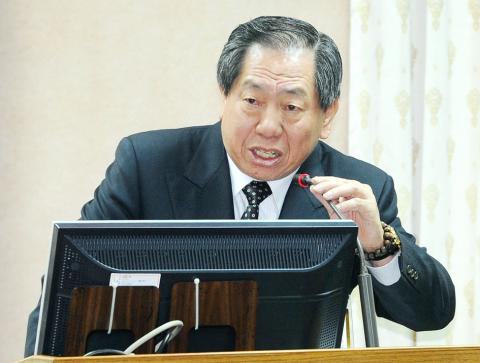National Security Bureau Director Tsai Der-sheng (蔡得勝) yesterday contradicted a statement made by Minister of National Defense Yen Ming (嚴明) on how long the country could withstand a Chinese attack.
Yen had said last week that Taiwan could survive “at least one month,” should China invade, without help from the US, adding the estimate was based on conclusions drawn from various war games.
Tsai was responding a request from Chinese Nationalist Party (KMT) Legislator Chien Tung-ming (簡東明) at a meeting of the legislature’s Foreign Affairs and National Defense Committee yesterday to comment on Yen’s remarks.

Photo: Wang Min-wei, Taipei Times
“The Ministry of National Defense has a better understanding of the military strength of both sides, so it said Taiwan’s military will be able to withstand a Chinese attack for one month. Yet whether the nation is capable of resisting for a month depends on the public’s will to resist an invasion. If everyone wants to leave, [Taiwan] might not be able to withstand for a month,” Tsai said.
He added that modern warfare proceeds very quickly, unlike during World War I or World War II.
Meanwhile, regarding the Legislative Yuan’s review of the cross-strait services trade agreement that is slated to begin tomorrow, Tsai yesterday said that any increased cross-strait interaction runs the risk of compromising national security, as China would attempt to infiltrate Taiwan.
However, he added that the bureau has already made a security assessment last month and taken necessary precautions with all related government agencies, but that the risks were minimal.
The assessment was sent to the Legislative Yuan last week, he added.
Democratic Progressive Party Legislator Tsai Huang-liang (蔡煌瑯) said that 784 Chinese are known to have overstayed their visas, with the number of illegal Chinese in the country coming to more than 1,000 if those smuggled in were also included.
These Chinese are in every part of the country, and pose considerable risk to society and national security, Tsai Huang-liang said.
When asked by if the bureau could get an accurate number on Chinese in Taiwan, Tsai Der-sheng said that if the bureau did not know the whereabouts of a Chinese national, then it did not keep tabs on them.
“We will attempt to find out their location and residence to do our best at maintaining security,” Tsai Der-sheng said.

INVESTIGATION: The case is the latest instance of a DPP figure being implicated in an espionage network accused of allegedly leaking information to Chinese intelligence Democratic Progressive Party (DPP) member Ho Jen-chieh (何仁傑) was detained and held incommunicado yesterday on suspicion of spying for China during his tenure as assistant to then-minister of foreign affairs Joseph Wu (吳釗燮). The Taipei District Prosecutors’ Office said Ho was implicated during its investigation into alleged spying activities by former Presidential Office consultant Wu Shang-yu (吳尚雨). Prosecutors said there is reason to believe Ho breached the National Security Act (國家安全法) by leaking classified Ministry of Foreign Affairs information to Chinese intelligence. Following interrogation, prosecutors petitioned the Taipei District Court to detain Ho, citing concerns over potential collusion or tampering of evidence. The

NEGOTIATIONS: Taiwan has good relations with Washington and the outlook for the negotiations looks promising, Minister of Economic Affairs J.W. Kuo said Taiwan’s GDP growth this year is expected to decrease by 0.43 to 1.61 percentage points due to the effects of US tariffs, National Development Council (NDC) Minister Paul Liu (劉鏡清) said at a meeting of the legislature’s Economics Committee in Taipei yesterday, citing a preliminary estimate by a private research institution. Taiwan’s economy would be significantly affected by the 32 percent “reciprocal” tariffs slapped by the US, which took effect yesterday, Liu said, adding that GDP growth could fall below 3 percent and potentially even dip below 2 percent to 1.53 percent this year. The council has commissioned another institution

NEGOTIATIONS: The US response to the countermeasures and plans Taiwan presented has been positive, including boosting procurement and investment, the president said Taiwan is included in the first group for trade negotiations with the US, President William Lai (賴清德) said yesterday, as he seeks to shield Taiwanese exporters from a 32 percent tariff. In Washington, US Trade Representative Jamieson Greer said in an interview on Fox News on Thursday that he would speak to his Taiwanese and Israeli counterparts yesterday about tariffs after holding a long discussion with the Vietnamese earlier. US President Donald Trump on Wednesday postponed punishing levies on multiple trade partners, including Taiwan, for three months after trillions of US dollars were wiped off global markets. He has maintained a 10 percent

TRADE: The premier pledged safeguards on ‘Made in Taiwan’ labeling, anti-dumping measures and stricter export controls to strengthen its position in trade talks Products labeled “made in Taiwan” must be genuinely made in Taiwan, Premier Cho Jung-tai (卓榮泰) said yesterday, vowing to enforce strict safeguards against “origin laundering” and initiate anti-dumping investigations to prevent China dumping its products in Taiwan. Cho made the remarks in a discussion session with representatives from industries in Kaohsiung. In response to the US government’s recent announcement of “reciprocal” tariffs on its trading partners, President William Lai (賴清德) and Cho last week began a series of consultations with industry leaders nationwide to gather feedback and address concerns. Taiwanese and US officials held a videoconference on Friday evening to discuss the